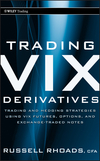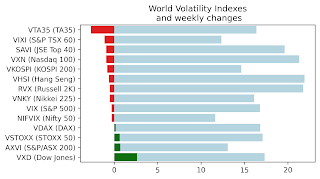There is a new page on my blog called Forecasts Tracker. It is located at the bottom of the right-hand menu. I created this page for the sake of full disclosure to the readers of this blog. Every month around the time of VIX expiration I make a forecast for the following month. Now you can see all my forecast in one place with dates and compare them to market forecasts.
One of the things that I do not like about some other blogs is that they make nebulous, equivocal forecasts, often using very wide ranges, or without specifying a time-frame. I would like to distinguish myself by making point forecasts and specifying the exact dates. You can review all the forecasts I made, judge their accuracy for yourself, or compare them with your own.
Matlab Computational Finance
 It is not a secret that I use Matlab almost daily, and it is my main tool for preparing analytics you see on my blog. Which is why I'm so stoked to learn about a virtual conference on Matlab applications to finance to take place on June 9th. Some of the highlights among presentations:
It is not a secret that I use Matlab almost daily, and it is my main tool for preparing analytics you see on my blog. Which is why I'm so stoked to learn about a virtual conference on Matlab applications to finance to take place on June 9th. Some of the highlights among presentations:Building Models for High-Frequency Algorithmic Trading Strategies Using MATLAB
This presentation provides an overview of how MATLAB is used at Deutsche Bank for research, development, calibration, and monitoring of quantitative models that inform high-frequency trading strategies used in the latest suite of Autobahn Equity algorithms. [I don't know much about DB's algos, as I use Knight for executions at work, but some of the DB's research on algos that I came across was super]
MATLAB: A Corporate Development Tool at Banc Sabadell
In this presentation, we show how Banc Sabadell uses MathWorks products in the day‐to‐day operations of the trading desk. We focus on Banc Sabadell's deployment environment and how MATLAB CompilerTM enables us to reach, and cater to the specific needs of, more than a thousand users. In particular, we examine the notion of "parallel deployment" with MATLAB, and how we have sped up some of our performance-critical functions by running them in parallel. [Matlab compiler was greatly improved in the v 2011a, and I would like to find out more about how other trading desk use matlab tools]
Finally, there is a presentation from Attilo Meucci that does not seem to do anything with Matlab, but rather about different steps from model estimation to execution, to post-trade analysis. His paper on this topic is available from SSRN.
Using New Volatility Products
Reminder, there will be a meetup this Thursday at 7 pm, ISE buiding at 60 Broad St., 26th floor New York, NY
From the event's description:
“It is no longer a VIX centric universe. Large banks are pushing vol products that are trying to capture the attention of options traders. Those products include VXX, VXZ, XXV, Volatility SKEW index, and others. How can we use them?”
From the event's description:
“It is no longer a VIX centric universe. Large banks are pushing vol products that are trying to capture the attention of options traders. Those products include VXX, VXZ, XXV, Volatility SKEW index, and others. How can we use them?”
VSTOXX Derivatives Growth
Eurex introduced VSTOXX futures and options (in their new incarnation) last June. Since it has been almost a year, I decided to look at the growth of volume and open interest on VSTOXX derivatives. Left axis for open interest, right axis for volume.


VSTOXX open interest has interesting V-shaped pattern - I think what happened is that a trader initiated a big trade soon after the contracts were listed. Initial data that I have points to a number of statistical / relative arbitrage opportunities, which have since disappeared. Otherwise volume and open interest in both futures and options exhibit consistent and robust growth.
Meanwhile iPath listed two ETFs VSXX(on XETRA and LSE), VSXY(XETRA), VSYG(LSE) - VSTOXX futures tracking ETF denominated in GBP and EUR. VSXX tracks short term futures index (similar to VXX) while VSXY/VSYG track the mid term futures index (similar to VXZ).
EDIT: VSTOXX derivatives were launched in March 2011, however my data set only started in July 2011.


VSTOXX open interest has interesting V-shaped pattern - I think what happened is that a trader initiated a big trade soon after the contracts were listed. Initial data that I have points to a number of statistical / relative arbitrage opportunities, which have since disappeared. Otherwise volume and open interest in both futures and options exhibit consistent and robust growth.
Meanwhile iPath listed two ETFs VSXX(on XETRA and LSE), VSXY(XETRA), VSYG(LSE) - VSTOXX futures tracking ETF denominated in GBP and EUR. VSXX tracks short term futures index (similar to VXX) while VSXY/VSYG track the mid term futures index (similar to VXZ).
EDIT: VSTOXX derivatives were launched in March 2011, however my data set only started in July 2011.
VOLT ETF / Voltage ETF
[EDIT: Updated info on VOLT here]
The fund is developed by Nomura and launched as Source ETF. The problem is - there's just not much info on the ETF that I can find, particularly no technical details whatsoever. Here is the official website for the ETF, and factsheet .The fund is based on NMEDVMU3 index, for which there is no information. From the two sources above I would like to quote the following:
"The Reference Index adjusts its exposure to the S&P 500 VIX Mid-Term Futures Index between 0% and 100% on a daily basis by reference to the previous 30-day volatility of the S&P 500 VIX Mid-Term Futures Index. This adjustment process aims to reduce the roll costs associated with holding a constant long volatility position (i.e. being 100% exposed to the S&P 500 VIX Mid-Term Futures Index at all times) while still seeking to capture the major spikes in volatility by adjusting its allocation to the S&P 500 VIX Mid-Term Futures Index on a daily basis based on the previous 30-day volatility of the S&P 500 VIX Mid-Term Futures Index."
1 Calculate 30-day historical volatility of SPVXMTR index
2 Create robust score for volatility based on median absolute deviation from the median, using all historical data
3 Allocate min(max(score+2,0)/9,1) % to SPVXMTR index.
As you can see below my version of VOLT does not look exactly like the official version.

So at this point there is not much more that I can add; if you have any info on the ETF please forward it to me. Also note that the fund is not available in the US but is available to European investors.
Trading VIX Derivatives
 EDIT: see my book review here.
Just came across this: Trading VIX Derivatives: Trading and Hedging Strategies Using VIX Futures, Options, and Exchange Traded Notes by Russell Rhoads is set to come out in September. This is afaik the first book that is dedicated to VIX derivatives. The table of contents is available here.
Looks like the first half of the book covers the basics like the historical background on implied volatility, the VIX, other volatility indexes, volatility strategy indexes, VIX derivatives, VIX-based ETFs and and their specs.
The second part of the book seems to have all the good stuff: hedging equity portfolios with VIX derivatives, speculating with VIX derivatives, and 3 chapters on different calendar spreads (a topic that I'm particularly interested in), and 2 chapters on verticals. Overall the book looks like an good read, and I will definitely review it again when I get a copy.
EDIT: see my book review here.
Just came across this: Trading VIX Derivatives: Trading and Hedging Strategies Using VIX Futures, Options, and Exchange Traded Notes by Russell Rhoads is set to come out in September. This is afaik the first book that is dedicated to VIX derivatives. The table of contents is available here.
Looks like the first half of the book covers the basics like the historical background on implied volatility, the VIX, other volatility indexes, volatility strategy indexes, VIX derivatives, VIX-based ETFs and and their specs.
The second part of the book seems to have all the good stuff: hedging equity portfolios with VIX derivatives, speculating with VIX derivatives, and 3 chapters on different calendar spreads (a topic that I'm particularly interested in), and 2 chapters on verticals. Overall the book looks like an good read, and I will definitely review it again when I get a copy.
Ukrainian Exchange Launches Options Trading
In the news that probably will not have much practical interest to most readers, but for the sake of complete volatility coverage ... Ukrainian Exchange listed options on UX Index - the benchmark stocks index of the Ukraine. I could not find volume information but open interest is high - higher than GVZ, for example. Implied volatility for June is about 35-40, and more or less closely follows the RTSVX - the Russian Volatility Index.

Press release here, exchange's website here.

Press release here, exchange's website here.
Subscribe to:
Posts (Atom)
Weekly market report
Wall st delivered a mixed bag of news with VIX, VNKY, and VSTOXX and their underlying markets almost unchanged. VXD - volatility index based...

-
John “Hojun” Hwang is the author of VIX, VIX Futures, and VIX ETNs, a conceptual guide to trading the VIX index. He graduated with degrees i...
-
Wall st delivered a mixed bag of news with VIX, VNKY, and VSTOXX and their underlying markets almost unchanged. VXD - volatility index based...
-
This week 's market movements were largely driven by renewed recession fears in the wake of a sharp rise in office v...

